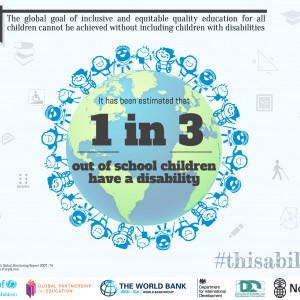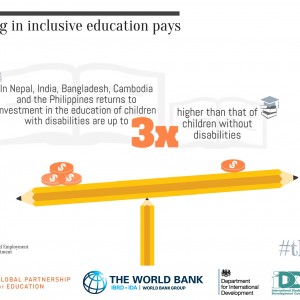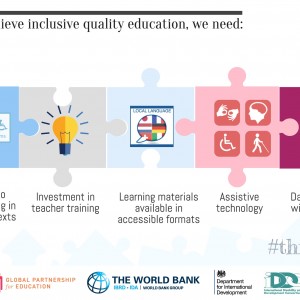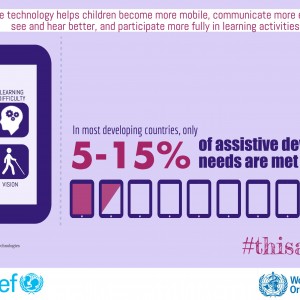Advocacy Efforts for Children with Disabilities
As part of the Commit to Inclusion (International) expansion, we would like to share these social media tools to help support disability advocacy the week of July 6-10, 2015.
These tools have been prepared for two key events: the Oslo Summit on Education for Development http://www.osloeducationsummit.no/ (Oslo, 6-7 July 2015); and for the UNICEF Assistive Products for Children with Disabilities (APCD) Forum http://www.unicef.org/supply/index_82298.html (Copenhagen, 6-7 July 2015). We would like to encourage you to use any social media channels to support the advocacy efforts for children with disabilities.
Oslo Summit on Education for Development
http://www.osloeducationsummit.no/
For the Oslo Summit, UNICEF is advocating for inclusive education and ALL children having the right to go to school. Please use the following materials on inclusive education for social media next week:
Hashtags:
GPE: #fundeducation
Conference: #EduSummitOslo
UNICEF Children with Disabilities: #thisability
Infographics:
Infographic 1
Text:
The Global Goal of inclusive and equitable education for all children cannot be achieved without children with disabilities. It has been estimated that 1 in 3 out of school children have a disability
Tweets:
• The Global Goal of INCLUSIVE & EQUITABLE #EDUCATION FOR ALL CHILDREN cannot be achieved without children with disabilities #thisability
• 1 in 3 out of school children have a disability #thisability
Source: UNESCO EFA Global Monitoring Report 2007: 74
Text:
Invest in Inclusive Education pays. In Nepal, Bangladesh, India and Cambodia returns to investment in the education of children with disabilities are up to 3x higher than that of children without disabilities
Tweets:
• Invest in #Inclusive #Education pays #thisability
• In South Asia returns to investment on #education of children with disabilities are up to 3x higher than that of children w/t disabilities
Source: Lamichhane, K. (2015). Disability, Education and Employment
Text:
To achieve inclusive quality education we need:
– Accessibility to schools, including in emergency contexts
– Investment in teachers training
– Learning materials available in accessible formats
– Assistive technology
– Data on children with disabilities
Tweets:
• For inclusive quality education we need: School access, teachers training, #assistech, data, accessible books
UNICEF Assistive Products for Children with Disabilities (APCD) Forum
http://www.unicef.org/supply/index_82298.html
The new UNICEF/WHO discussion paper “Assistive Technology for Children with Disabilities: Creating Opportunities for Education, Inclusion and Participation”, will be launched on Monday in Copenhagen. An electronic version of the paper along with easy-to-read, ePub, DAISY and accessible html formats will be available on the UNICEF Disability website under the section resources as of Monday. http://www.unicef.org/disabilities/index_71769.html
For the UNICEF Assistive Product forum, UNICEF is advocating for ALL children with disabilities to have the assistive technologies they need. Please use the following related materials for social media next week:
Text:
Assistive Technology helps children to become more mobile, communicate more effectively, see and hear better and participate more fully in learning activities.
In most developing countries, only 5-15% of assistive devices needs are met #thisability
Tweets:
• Assistive Technology helps children become mobile, communicate more effectively,see,hear better & participate fully in learning #thisability
• #assistivetech helps children 2 become mobile, communicate, see, hear better & participate fully in learning activities #thisability
• In most developing countries only 5-15% of assistive devices needs are met #thisability
Please also follow @UNICEFSupply and retweet.
Hashtags:
UNICEF Children with Disabilities: #thisability
Source: WHO (2008). Assistive devices/technologies






